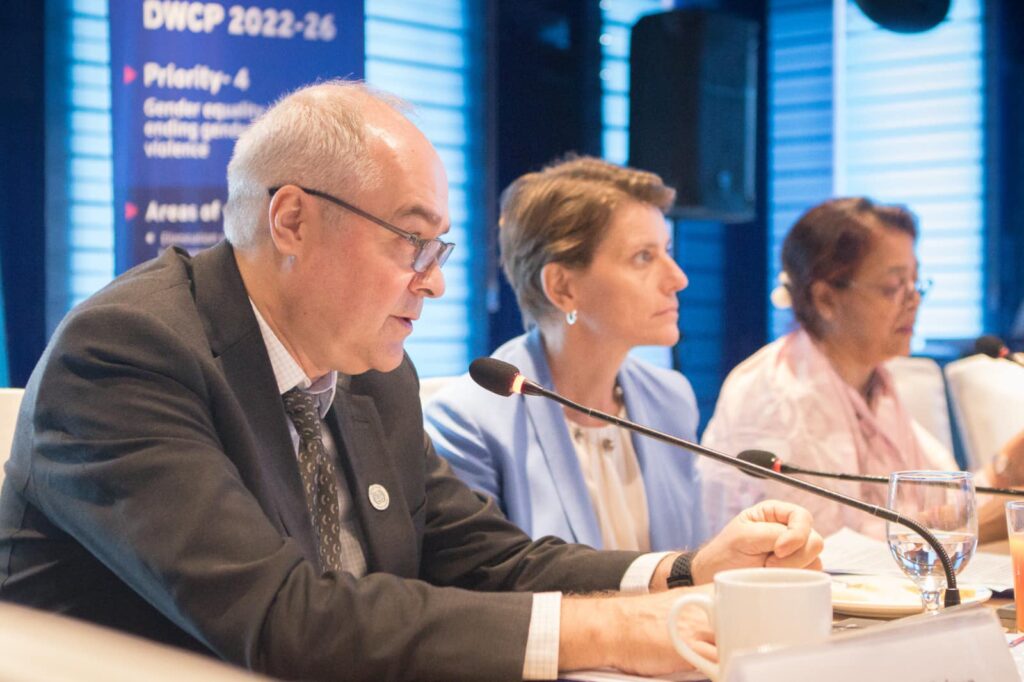DHAKA (ILO News) – A recent time-use survey by the Bangladesh Bureau of Statistics, supported by UN Women, reveals that women in Bangladesh perform more than seven times as much unpaid care and domestic work as men – work that is largely invisible, undervalued and linked to traditional domestic roles that are deeply rooted in cultural norms and considered low-skilled.
“Caregiving is an essential part of who we are and it is important that we first recognize the need for caregiving and then identify measures to redistribute caregiving to reduce the caregiving burden on women,” said MP Simeen Hussein Rimi, Minister of State for Women and Caregiving.

© United Nations Women's Organisation
At the event, the ILO and UN Women presented the concept of a new joint programme to promote change in practices and behaviours to address discriminatory social norms around care work. The programme aims to integrate gender transformative measures into national and sector policies in line with the global 5R framework on decent care work: recognise, reduce and redistribute unpaid care work, reward and represent paid care work. This includes improving labour market policies and governance to promote decent care work in the care sector, as well as strengthening access to social welfare infrastructure and services.
The agencies also made recommendations for increasing investment in the care economy, including improving access to gender-sensitive care policies and services, strengthening social and physical infrastructure, creating decent work opportunities, and addressing social norms and the gender division of labor.

© ©ILO
Gwyn Lewis, UN Resident Coordinator in Bangladesh, highlighted the economic and social benefits of investing in the care economy. “Investing in the care economy means creating decent work opportunities – in particular by promoting women's participation in the workforce, reducing gender and intersectional inequalities, including the gender gap in employment, and expanding the means to ensure quality and affordable care services for all. Investing in the care economy and transformative care policies is therefore not only a smart economic choice, but also an important step towards achieving gender equality and social justice,” said Lewis.
The discussion highlighted that investing in care policy and infrastructure in Bangladesh is a strategic economic decision. Allocating 3.99% of GDP to the care sector will generate around 7 million new jobs by 2035, of which 91% will be full-time for women. This investment has the potential to significantly narrow the gender employment gap and promote gender equality, social justice and human rights. Moreover, investment in innovative and time-saving solutions can significantly reduce the burden associated with household and work chores.
“The National Women's Development Policy (NWDP) is currently under review and aims to address critical needs such as transport, housing, accommodation, toilets, separate latrines and day care centres where women are employed in large numbers,” said Nazma Mobarek, director-general of the Women's Development Agency.

© United Nations Women's Organisation
The ILO has been providing technical assistance to the Government of Bangladesh to institutionalize the care economy by developing a qualification package in care training for young people who may engage in the domestic or international labour market. This training includes both childcare and elderly care. The European Union and the Government of Canada have funded these efforts which aim to create dignified labour migration opportunities for aspiring migrant workers. So far, around 300 young people have been trained in various training institutes and 70% are now self-employed or engaged in wage employment.
“Care work must be recognised and valued as a vital contribution to society and the economy. Government leadership and collaboration with the private sector is essential to advance the right policies and skills to ensure fair wages, good working conditions and quality care services in Bangladesh,” said Tuomo Puutiainen.
While the ILO has been working for many years to build strong systems for training skilled caregivers, a new joint ILO-UN Women programme will focus on renewed efforts to strengthen the care economy by providing normative and policy support to governments and strengthening the overall care infrastructure, including by restructuring policies to enable greater investment in the care economy.


